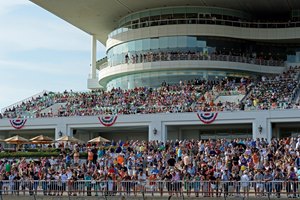Illinois Racing Board Threatens to Shut Down Arlington


The Illinois Racing Board Sept. 17 threatened to deny Arlington International Racecourse racing dates for 2020 unless its owner, Churchill Downs Inc., can demonstrate within one week a concrete commitment to racing.
The board adjourned its annual dates-award hearing until Sept. 24 and appointed a three-member committee to listen to "any new proposal which Churchill may wish to make."
The action stems from a CDI decision not to apply for a gaming license at Arlington under terms of a new state law—an action that would cost purse accounts many millions of dollars a year. The decision, after years of Arlington lobbying for the right to run casino games, came some five months after CDI took a majority stake in Rivers Casino, located less than 15 miles from Arlington.
Commissioner Thomas McCauley, who suggested the delay, charged CDI's decision was motivated solely by a desire to protect Rivers and the CDI bottom line and represented a repudiation of the company's obligations to the state and the racing community.
McCauley said the one-week window gives CDI an opportunity to show "whether it really wants to signal to the world, once and for all, that it's only a gaming and software company and no longer a horse racing enterprise, whether it wants to jeopardize its racing license and all the revenue which the privilege associated with that license will generate. That will be up to Churchill ...
"However, if there is no modification of the Churchill-Arlington position on gaming during the adjournment period, it may be that there will be no organization license for Arlington and, hence, no racing. That will cause disruption. But it's the protection of Rivers and the bottom line that will have caused that disruption," McCauley added.
The action, approved unanimously, caught the Illinois racing community, including horsemen's organizations and other tracks, off guard and left as anyone's guess how a 2020 Illinois Thoroughbred season without Arlington could be structured.
Hawthorne Race Course did not apply for its normal early-year dates, arguing it would not be practical to run Thoroughbreds at the west-suburban Chicago track during all-out construction of its casino—a $250 million project expected to last from January through late summer.
However, McCauley, in an unrelated exchange early in the IRB meeting, asked Hawthorne President Tim Carey, "Thoroughbreds could race? It could be worked out?" Carey replied, "Yes. It could be."
Once the threat to Arlington's midsummer dates was on the table, Carey said, "We will do whatever is best for Illinois racing."
And Fairmount Park President Brian Zander said his track in downstate Collinsville is busy repairing barns in hopes of providing opportunities for horsemen once Hawthorne's fall 2019 meetings ends. But Fairmount, after struggling for years, plans to run only 60 live racing dates in 2020.
"We're not counting on any additional (gaming) revenue for 2020," Zander said. "What we want to do is pay purses forward and give the horsemen an incentive to expand their stock."
IRB Chairman Jeffrey Brincat asked Arlington President Tony Petrillo what modifications in the new gaming law could sway CDI to apply for a license. Petrillo, citing unfamiliarity with deliberations at CDI's Louisville headquarters, maintained only that the law does not provide the right "environment" for a racino.
"My concern," Brincat said, "what we're trying to ascertain, is what that (right) environment might look like."
"We were here today to talk about racing dates for 2020, not potentially putting a racetrack out of business," Petrillo said after the meeting.
It also was unclear what the IRB might consider an acceptable modification of Arlington's position. Although most of the state racing establishment believed the deadline for applying for a racetrack gaming license passed on Aug. 27, the Illinois Gaming Board, which administers the law, insists that date was "not a deadline."
And the Illinois General Assembly—at its November veto session—is expected to consider modifications of the law's tax structure and could conceivably address any of CDI's concerns.
"The whole question is their commitment to racing," said David McCaffrey, executive director of the Illinois Thoroughbred Horsemen's Association. "It was very nice to hear the Illinois Racing Board question Churchill Downs' commitment to racing. That's something we have questioned since Aug. 27 (when CDI announced the no-casino decision)."
McCaffrey suggested Arlington voluntarily forego about $4 million in "recapture" money it is due from the 2020 purse account.
"They should be here a week from today and say they are not going to take out recapture," he said. "Or commit to put half the proceeds from sports betting into purses."
McCauley disagreed.
"My position would be that the solution was already there and Churchill rejected the solution. And I don't think there's going to be any other solution," McCauley said. "I don't think the General Assembly is going to be budged by anybody, much less horse racing, which took 20 years to get what they wanted, they were given what they wanted and then, you know, certain people took advantage of it, others not."
Before the Arlington-CDI flap erupted, Carey waxed eloquent about Hawthorne's future, describing a complete remake of the physical plant with a five-story parking garage and a second-story casino designed so that racing remains the primary focus. The Carey family, he mentioned, has been involved in Chicago-area racing for 110 years and is committed to it.
He said Hawthorne also would be willing to "pay forward" to increase purses during the fall 2020 meeting the track requested and predicted significant purse hikes once casino revenue begins flowing in 2020. He said he plans to reinstate as much of the former stakes program as possible, including the Illinois Derby and the Hawthorne Gold Cup, races he said were put on hiatus to maximize money for daily purses.
"I envision extreme excitement," Carey said. "It's going to be cool, man!"
